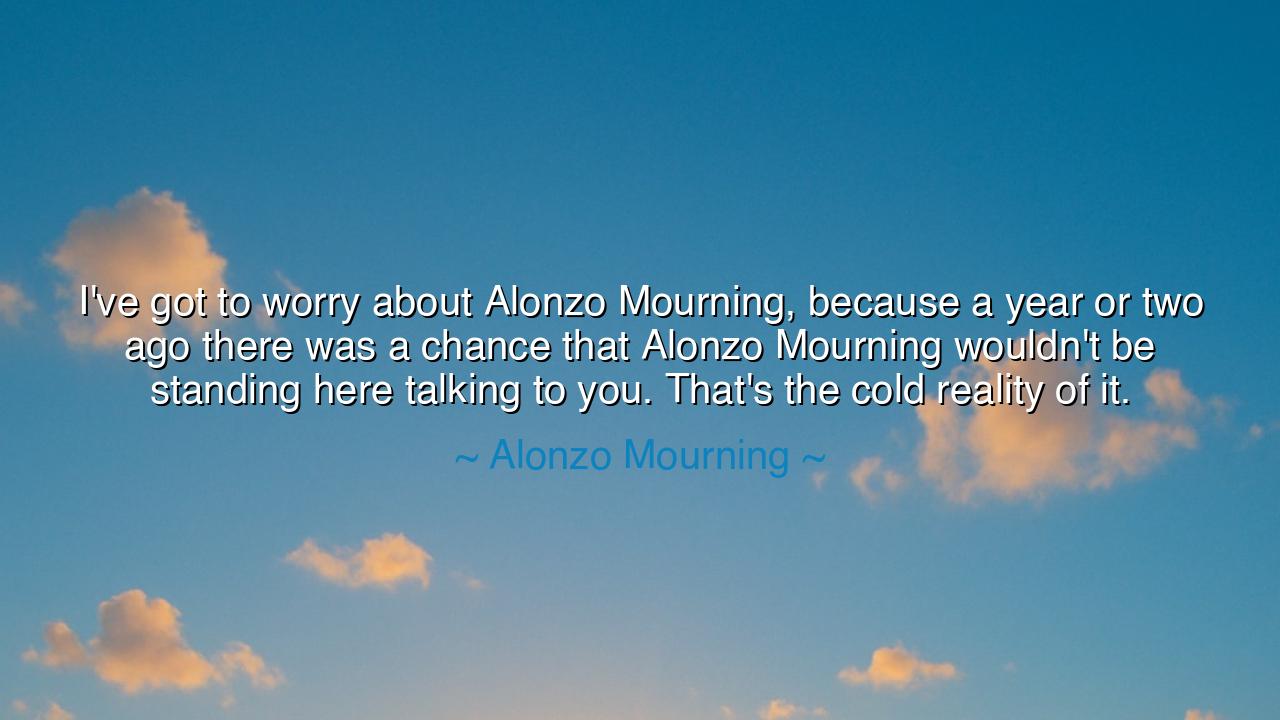
I've got to worry about Alonzo Mourning, because a year or two
I've got to worry about Alonzo Mourning, because a year or two ago there was a chance that Alonzo Mourning wouldn't be standing here talking to you. That's the cold reality of it.






In the poignant words of Alonzo Mourning, "I've got to worry about Alonzo Mourning, because a year or two ago there was a chance that Alonzo Mourning wouldn't be standing here talking to you. That's the cold reality of it," we are confronted with the fragility of life and the ever-present uncertainty of existence. Mourning, a legendary basketball player, speaks with the clarity of someone who has faced the very real possibility of death, only to emerge stronger and more aware of the preciousness of life. His statement is a stark reminder that, at any given moment, our future is never guaranteed. It is a reflection of the human condition, one where we must all confront the truth that life can change in an instant, and we are not always in control of the forces that shape our destiny.
This truth has echoed through the teachings of the ancients. In the Greek tragedies, the concept of fate was a central theme. Heroes, no matter how strong or noble, were often at the mercy of the gods, their destinies determined by forces beyond their control. Sophocles, in his play Oedipus Rex, explores the tragic irony that Oedipus, despite all his wisdom and strength, could not escape the fate that had been foretold for him. In much the same way, Mourning's words reflect the ephemeral nature of life and the unpredictable twists of fate. No matter how much we plan, no matter how hard we work, we cannot control the unforeseen challenges that life throws our way.
Consider the life of Hector, the Trojan prince and hero of Homer’s Iliad. Hector was a mighty warrior, beloved by his people and revered for his bravery, yet he was still subject to the whims of the gods. Despite his valor, his death at the hands of Achilles was predestined, a result of the forces beyond his control. Hector's fate was sealed long before the battle, and though he fought with all his might, he could not change the course of destiny. Mourning's words echo this ancient understanding of life’s unpredictability—no matter how prepared we think we are, there are moments when life itself demands more from us than we could have anticipated.
In modern times, the story of Lance Armstrong, the legendary cyclist who overcame cancer to win the Tour de France, serves as a powerful reminder of life's fragility and the strength of the human spirit. Armstrong’s battle with cancer, followed by his triumphant return to the sport, mirrors Mourning’s own struggles. Armstrong, like Mourning, was forced to confront the possibility of death, only to find in that challenge a greater determination to succeed. Both men’s stories reveal the mysterious ways in which life can present us with obstacles that seem insurmountable, but also the resilience of the human spirit to overcome even the harshest of realities.
Mourning's reflection on his own survival offers a valuable lesson: life is unpredictable, and we are not guaranteed tomorrow. Yet, it is through the struggle that we find our true strength. His words reflect a humbling truth that we must all accept—no matter our talents, our plans, or our efforts, we are subject to the uncontrollable forces of life. What defines us is not how we avoid those forces, but how we respond to them. Strength is not simply about overcoming external challenges, but about embracing the uncertainty of existence with courage and resilience.
This lesson of impermanence calls us to cherish each moment, to live with intention, and to never take our health, our family, or our loved ones for granted. Just as Mourning faced his health crisis with bravery, we too must face the inevitable challenges of life with grace and determination. The world may change, and the future may be uncertain, but we have the power to shape how we respond. Like the ancient heroes, we are tasked with accepting our fate, even as we fight to live fully and with purpose.
In our daily lives, let us adopt Mourning’s philosophy: acknowledge the fragility of life, but also the power of resilience. Let us be grateful for the time we have, and let it inspire us to live with more passion, purpose, and commitment. When faced with adversity, let us embrace it as an opportunity for growth and strength. In this way, we transform the cold reality of life’s unpredictability into a force of courage and determination. The lesson Mourning imparts is clear—life is fragile, but our ability to rise, to face the storm with unwavering resolve, is what ultimately defines us.






AAdministratorAdministrator
Welcome, honored guests. Please leave a comment, we will respond soon